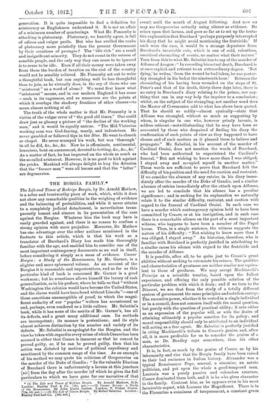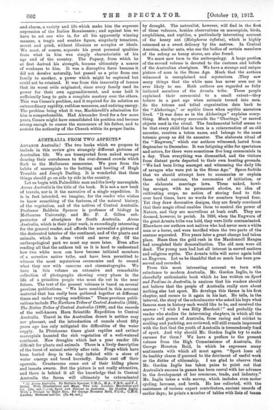THE BORGIA FAMILY.* The Life and Times of Rodrigo Borgia,
by Dr. Arnold Mathew, is a sober and trustworthy piece of work, which, while it does not show any remarkable qualities in the weighing of evidence and the balancing of probabilities, and while it never attains to a completely judicial detachment, is nevertheless trans- parently honest and sincere in its presentation of the case against the Borgias. Whatever bias the book may have is easily guarded against, and there is no reason to confuse a strong opinion with mere prejudice. Moreover, Dr. Mathew has one advantage over the other authors mentioned in the footnote to this article, which is that his work as a translator of Burchard's Diary has made him thoroughly familiar with the age, and enabled him to consider one of the most important contemporary documents as an end in itself, before considering it simply as a mass of evidence. Caesar Borgia : a Study of the Renaissance, by Mr. Garner, is a slighter and more ephemeral volume. As an account of the Borgias it is reasonable and unpretentious, and as far as this particular kind of book is concerned Mr. Garner is a good workman ; but he sometimes allows himself the luxury of rash generalization, as in his preface, where he tells us that "without Washington the colonies would have become the United States, and the slaves would have been freed without Lincoln "—one of those assertions unsusceptible of proof, to which the magni- ficent audacity of our " popular" writers has accustomed us and, perhaps, even rendered us a little callous. Mr. Sabatini's book, while it has nom: of the merits of Mr. Garner's, has all its defects, and a great many additional ones. Its methods are incompetent; its manner is pretentious ; and its style almost achieves distinction by the number and variety of its defects. Mr. Sabatini is an apologist for the Borgias, and the view he takes with regard to every crime of which Cesare has been accused is either that Cesare is innocent or that he cannot be proved guilty, or, if he can be proved guilty, then that his action was dictated by motives of political expediency and sanctioned by the common usage of the time. As an example of his method we may quote his criticism of Gregorovius on the murder of the Duke of Gandia : " In the valuable Diarium of Burchard there is unfortunately a lacuna at this juncture [sic] from the day after the murder (of which he gives the full particulars to which we have gone for our narrative of that
• (1) The Life and Times of Rodrigo Borgia. By Arnold Mathew, D.D. London: Stanley Paul & Co. [163. net. J—(2) Caesar Borgia : a Study Lf the Renaissance. By John Leslie Garner. London: T. Fisher 1:Inwin. 12s. 6d. net.]—(3) The Life of Cesare Borgia. By Rafael Sabatini. Loudon : tanley Paul and Co. [16e. net.] —
event) until the mouth of August following. And now we may see Gregorovius actually using silence as evidence. He seizes upon that lacuna, and goes so far as to set up the tenta- tive explanation that Burchard perhaps purposely interrupted his diary that he might avoid mentioning the fratricide.' If such were the case, it would be a strange departure from Burchard's invariable rule, which is one of cold, relentless, uncritical chronicling of events, no matter what their nature." Turn from this to what Mr. Sabatini has to say of the murder of Alfonso of Aragon : " In recording his actual death, Burchard is at once explicit and reticent to an extraordinary degree. 'Not dying,' he writes, from the wound he had taken, he was yester- day strangled in his bed at the nineteenth hour.' Between the chronicling of his having been wounded on the steps of St. Peter's and that of his death, thirty-three days later, there is no entry in Burchard's diary relating to the prince, nor any- thing that can in any way help the inquirer to a conclusion ; whilst, on the subject of the strangling, not another word does the Master of Ceremonies add to what has above been quoted. That he should so coldly—almost cynically—state that Alfonso was strangled, without so much as suggesting by whom, is singular in one who, however grimly laconic, is seldom reticent—notwithstanding that he may have been so accounted by those who despaired of finding his diary the confirmation of such points of view as they happened to have chosen and of such matters as it pleased them to believe and propagate." Mr. Sabatini, in his account of the murder of Cardinal Orsini, does not mention the words of Burchard, who had been authorized to superintend the Cardinal's funeral, " But not wishing to know more than I was obliged, I stayed away and occupied myself in another matter." These words are sufficient to prove that Burchard felt the difficulty of his position and the need for caution and restraint. If we consider the absence of any entries in his diary imme- diately after the murder of the Duke of Gandia, and a similar absence of entries immediately after the attack upon Alfonso, we are led to conclude that his silence has a peculiar significance ; and in seeking for its explanation we naturally relate it to the similar difficulty, restraint, and caution with regard to the funeral of Cardinal Orsini. In each case we have a murder which contemporary opinion held to have been committed by Cesare, or at his instigation, and in each case there is a remarkable silence on the part of a most important witness, who happens to have been a member of the Papal house. Then, in a single sentence, the witness suggests the nature, of his difficulty : " Not wishing to know more than I was obliged, I stayed away." An historian, therefore, who is familiar with Burchard is perfectly justified in attributing to a similar cause his silence with regard to the fratricide and the .murder of Alfonso.
It is possible, after all, to be quite just to Cesare's great abilities without seeking to extenuate his crimes. The qualities and characteristics of greatness are neither similar nor eqeiva- lent to those of goodness. We may accept Machiavelli's Principe as a scientific treatise, based upon the fullest experience, and offering the only possible solution of the particular problem with which it deals ; and if we turn to the Discorsi, we see that from the study of a totally different system of government the same principles and solution emerge. The executive power, whether it be vested in a single individual or in a council, does not concern itself with the moral question, but purely with the question of practical utility; it acts either as an expression of the popular will, or with the desire of attaining ultimately a popular sanction for its policy ; and moral responSibility should only be attributed to an individual will acting as a free agent. Mr. Sabatini is perfectly justified in citing Machiavelli's tribute to Cesare's genius, and, after all it is more profitable for us to consider the genius of a man, as Dr. Bradley says somewhere, than his other characteristics.
It is, in fact, as much by the genius of Cesare as by his inhumanity and vice that the Borgia family have been raised to their had eminence in Italian history. Alexander was a typical Renaissance Pope, sensual, a simoniac, an astute politician, and yet upon the whole a good-tempered man. Lucrezia was a purely passive and colourless creature. Cesare dominated them both, and it is he who gives character to the family. Contrast him, as he appears even in his most favoUrable aspect, with Lorenzo the Magnificent. There is in the Florentine a sunniness of :temperament, a constant grace And charm, a variety and life which make him the supreme expression of the Italian Renaissance ; and against him we have to set one who is, for all his apparently winning manner, a tragic and sombre figure, singularly tenacious, secret and quick, without illusions or scruples or ideals. We must, of course, separate his great personal qualities from what iu him was simply characteristic of his age and of the country. The Papacy, from which he at first derived his strength, became ultimately a source of weakness to him. It was a disruptive force because it did not devolve naturally, but passed as a prize from one family to another, a power which might be captured but could not be retained. It was from this insecurity of tenure that its worst evils originated, since every family used its power for their own aggrandisement, and none held it sufficiently long to gain a complete mastery over the others. This was Cesare's problem, and it required for its solution an .extraordinary rapidity, ruthless measures, and untiring energy. The problem being what it was, Machiavelli's admiration for him is comprehensible. Had Alexander lived for a few more years, Cesare might have consolidated his position and become strong enough to coerce the successors of his father, and to restrict the authority of the Church within its proper limits.















































 Previous page
Previous page